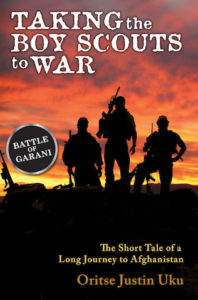Chapter 1: The Letter
It was January 13, 2008 when I received the letter. This was the letter that every former soldier dreads. It had been sixteen months since I’d left the army to attend graduate school. Most of the junior officers I knew were doing the same thing. Many of us were headed to business school or law school, but we were all trying to move on with life after the army.
On this particular night, I’d just flown back to Boston after spending the holidays with my family in Phoenix. I’d always been stationed overseas, so this was only the second holiday season I’d spent with my family in the previous six years. To celebrate my return to Boston and the beginning of my final semester of business school, I went out for drinks that night with my classmate and good friend, Patrick Long. We hung out until after 1:00 a.m., said our good-nights, and each went home. When I climbed into bed at 2:00 a.m., I was in a good mood. Then I saw it.
This was the letter that every former soldier dreads.
Lying on the floor next to my bed was a FedEx envelope. My roommate, Stacey, had put it there for me while I was home for the holidays. As I picked up the envelope, a sense of absolute panic overtook me. It was from the Department of the Army, addressed to Captain Oritse J. Uku. I’d received plenty of mail from the army since I’d gotten out in September 2006, usually from Army National Guard or Army Reserve units seeking to recruit young officers fresh off active duty. There was a shortage of military intelligence officers like me, so that was to be expected. This was different, though.
After you get out, you hear about the FedEx envelope. When the army is recalling you back to active duty, using Federal Express rather than the US Postal Service seems to come in handy. It’s never welcome news, so by using FedEx, someone has to sign for the envelope, and you can’t claim you didn’t receive your orders.
It was 2:00 a.m. and there was nothing I could do about the situation, so I figured I’d go to sleep and open the envelope in the morning. I proceeded to lay there for the next sixty minutes, completely unable to sleep. I gave up trying and got up to face the inevitable bad news. I pulled that little red string across the top of the envelope hoping for the best, but fully expecting the worst. I got the worst.
Not many people outside of the military are familiar with the Individual Ready Reserve (IRR) program. It is a program that allows the military to recall service members after they’ve left the service, during times of war. All branches of the military have an IRR program, but as far as I know, only the army and the marines have been recalling their service members due to the Global War on Terror.
Understandably, no one appears to want a military draft. The United States has worked hard to create a professional military in the post-Vietnam era. For politicians, it seems like political suicide to suggest a draft. I’ve never met a military leader who liked the idea. And I’m certain that all those military age males who aren’t even keeping track of what’s going on in Iraq and Afghanistan have no interest in a draft. So how do you deal with manning shortages in a two-front war with no draft? You recall IRR soldiers and marines. It’s not a draft, because they are still under commitment, and it doesn’t seem to draw any media attention whatsoever.
So now I was another casualty of the IRR program. In fact, I and the others like me would be known as IRR soldiers and IRR officers. That status would differentiate us from the active duty, National Guard, and reserves. We were there to do our duty, but we were not volunteers.
Understandably, no one appears to want a military draft. The United States has worked hard to create a professional military in the post-Vietnam era.
As I caught my breath and better examined the orders that had just turned my world upside down, I noticed that they were dated three weeks prior. I was supposed to report for duty at Fort Jackson, South Carolina in six days! I had four months until I was going to graduate with my MBA. I had an apartment with a roommate. My family lived on the other side of the country. Yet I was supposed to uproot and report, to go God knows where, in six days! My night had gone from pretty good to terribly bad in a little over an hour. I was now an IRR officer. Back in the service.

Thanks for reading Chapter 1 of Taking the Boy Scouts to War: The Short Tale of a Long Journey to Afghanistan. I wrote this book on behalf of all those who served in America’s Longest War, but don’t have the opportunity to tell their stories.
If you’re looking for a way to show your support to our veterans of recent war, please consider donating to the Iraq and Afghanistan Veterans of America (IAVA) or Wounded Warrior Project. And as always, thank a veteran. Hire one. Thank you!
Copyright © 2009–2014 Oritse Justin Uku. All rights reserved. Written permission is required to use or reproduce any part of this book, except for brief quotations in critical reviews and articles.


